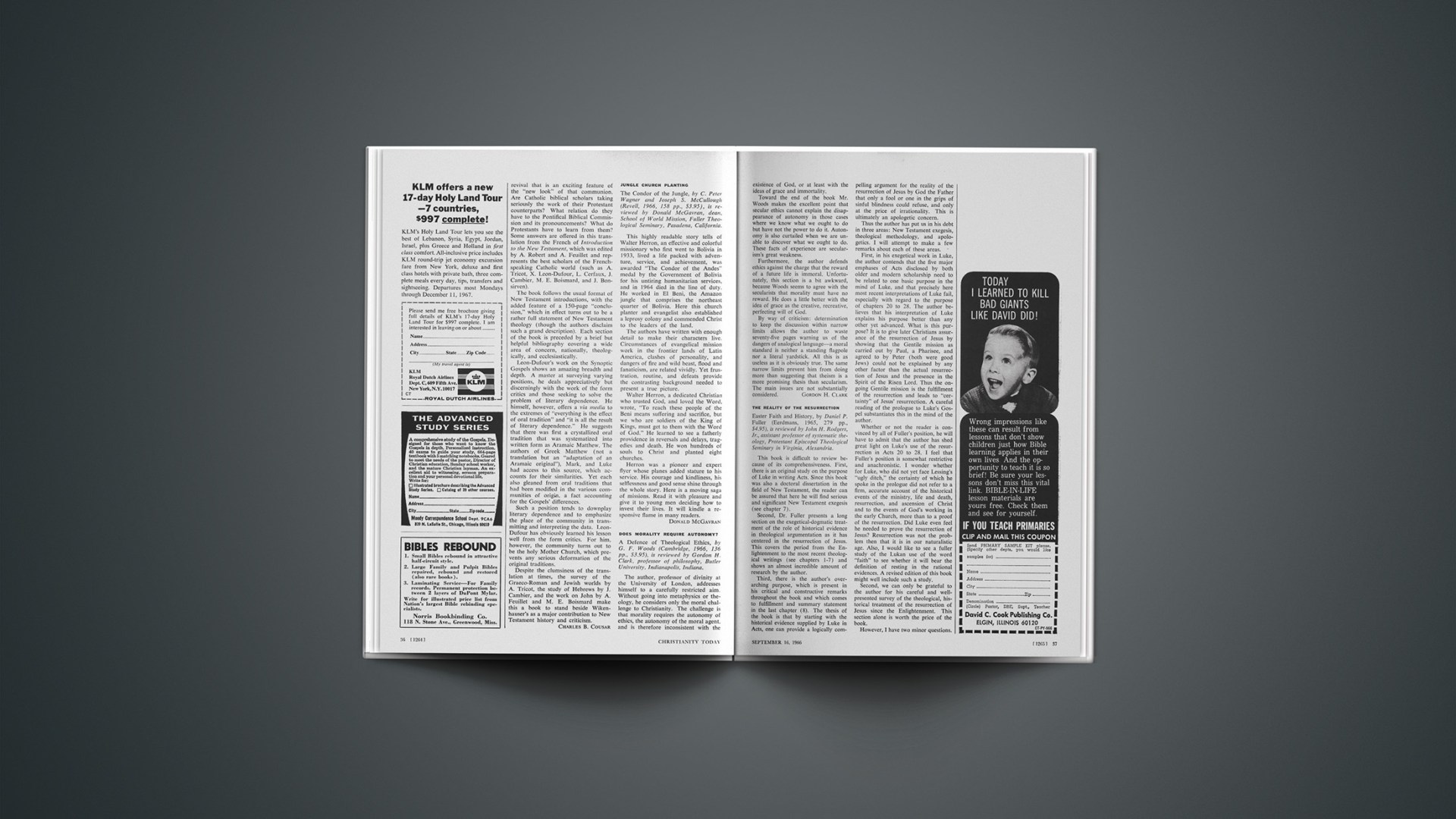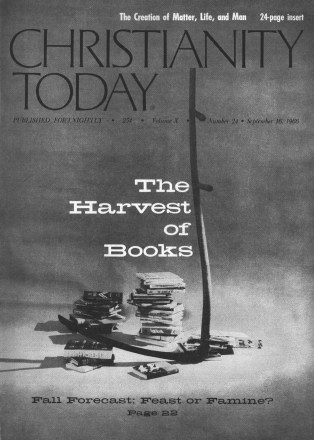Methodist theologian Albert Outler treated the eleventh World Methodist Conference in London last month to a satirical romp through “current theologizing and its vogue-ishness.” Included in his survey was what he called “the old orthodoxy,” which, far from vanishing, was growing and becoming increasingly articulate and reflective. “This is a world come of age, as every sophisticate knows,” exclaimed Outler in mock surprise. “Supernaturalism has had it, modern man is radically secular and has jettisoned his cargo of overbelief.… And yet the fundamentalists and conservatives refuse to roll over and play dead … insufferable cheek! Billy Graham makes at least as much of a dent in London as the Bishop of Woolwich has made.”
The Southern Methodist University scholar then gave a quizzical glance at the old neo-orthodoxy and decided it was doing well, before giving a zany account of “the noisiest beach-party on our stretch of it”—the new humanists who were having a ball, fascinating the journalists, and upsetting “the ecclesiastical lifeguards.” Dietrich Bonhoeffer came in for some rare criticism here as “that fortunate martyr who secularized the distinction the fundamentalists have always made between religion (n.g.!) and Christianity (O.K.!) and did not live to discover that real secularists … can dispense with Christianity as readily as religion (or rather more so).”
Bishop Fred Pierce Corson of Philadelphia, who as president of the World Methodist Council had earlier arrived in London for council and conference meetings, found heated discussion about a press report that attributed to him a prediction that Methodists and Roman Catholics would be considering a “definite” union plan by 1971. Corson said there had obviously been a “misunderstanding” over his remarks.
Speaking at the inaugural joint meeting, John Cardinal Heenan expressed joy that “no Christian body now feels happy to celebrate its great occasions in isolation.” Nevertheless, he made it clear that he did not consider most international conferences important, and suggested the danger that their multiplication might lead to “a neglect of pastoral action.”
One of the perils of ecumenism, continued Britain’s ranking Roman Catholic, was that “if too much time is spent in speculation there will be too little spent in preaching the Word of God.” People should be the first concern. “Christ gave the messengers of John the Baptist the formula for recognizing his church, ‘The poor have the Gospel preached to them’ (Matt. 11:5).” Dr. Heenan suggested that the conference theme, “God in Our World,” “should, of course, be ‘God in His World.’ ”
Dr. Harold Roberts, chairman of the Methodist committee negotiating with the Anglicans, echoed a note of uncritical enthusiasm about the progress of unity talks. He admitted that there were difficulties, although he was persuaded that these would be resolved in time if too much were not attempted at once. (The joint Anglican-Methodist negotiating committee is expected to publish an official report within the next few months.)
American delegates expressed privately to a CHRISTIANITY TODAY reporter their misgivings about these current talks. They felt that British Methodism might be swallowed up in the larger Anglican body and lose its worldwide Methodist affiliations and its emphasis on the priesthood of all believers. But the delegates to the Methodist Youth Conference, meeting in Bath a week earlier, viewed things differently: they want future youth conferences to be ecumenical. “We as Methodists,” said a resolution they adopted, “are not interested in self-preservation of Methodism but in sharing our heritage with the whole Church of Christ.”
Is The Bishop A Swinger?
From last month’s world assembly of Methodists came the selection of a ten-member commission to meet in a dialogue with Roman Catholics. Bishop Corson’s presidential address warned, however, against plunging “headlong into a unity which is not fully comprehended.”
A curious sidelight on the meeting was the delivery by a postman of a small parcel that in large print was addressed to “The President, World Methodist Conference, Central Hall, Westminster, London (Swinging) England.” On the other side of the package was written, “Jesus Was Dynamic.”
The 3,000 delegates from more than fifty countries saw inducted as the new president of the World Methodist Council 61-year-old Bishop Odd Hagen. Now a Swedish citizen, Bishop Hagen was born in Norway and served several churches there before joining the faculty at Gothenburg’s Union Scandinavian School of Theology, where later he was principal till he became bishop in 1953.
A Right To Be Heard On Tongues
“If any voice has the right to be heard on glossolalia, it should be America’s oldest Pentecostal church,” stated Wade H. Horton, general executive of the Cleveland, Tennessee-based Church of God. Alarmed by the rise of “variant and immature voices,” the eighty-year-old denomination released its newest book on The Glossolalia Phenomenon at its biennial General Assembly in Memphis, August 10–15.
Introducing the book to the 15,000 delegates, Horton made reference to neo-Pentecostals with “perverted concepts concerning the operation and usage of glossolalia” and to older extremists within the movement “who are continually riding on the crest of a miracle … whose sensibilities are attuned to the sensational.”
“The purpose of this divine effusion is to propagate, prophesy, and preach the Gospel,” he contended.
Later General Secretary Ralph E. Williams reported, “We now have 727,000 members in all fifty states and seventy-two foreign countries.” During the past biennium 588 new churches were organized, bringing the total to 8,434.” Membership in the United States now totals 221,000 members in 3,464 churches, making it the nation’s third-largest Pentecostal body.
The assembly learned that a new “Metropolitan Evangelism Program” had achieved signal success in Boston, Chicago, Toronto, and other cities. “In eighteen months we have organized five new churches in Philadelphia, and two are already self-supporting. Previously, we had only one struggling church in that city,” said Walter R. Pettitt, director of home missions and evangelism.
Other reports of progress were that a new Indian school was planned for Gallup, New Mexico; that churches in the New England states had grown sufficiently to be divided and placed under the supervision of two overseers; and that seventy college students had been commissioned for summer-volunteer service in door-to-door evangelism in new areas.
G. A. Swanson, European servicemen’s director, told of nearly thirty local fellowships meeting on military bases, of the new Servicemen’s Center in Kaiserslautern, Germany, and of plans for centers to open soon in Japan and South Viet Nam.
In business sessions, the General Council, which is composed only of ordained ministers, struck down forty years of segregation in the denomination by dissolving the separate administration of its 166 Negro churches, eliminating Negro state superintendents, and removing all mentions of the word “colored” in its minutes and by-laws.
The new ruling stated, “Any reference to the separation of ethnic or racial groups in the Church of God is incongruent with the resolution on human rights passed at the 1964 General Assembly” in Dallas. The 1964 resolution defined integration as “the right to worship, vote, rest, eat, sleep, be educated, live and work on the same basis as other citizens.”
Other council sessions revealed an increased emphasis on education in the fast-growing church. Two years ago, Dr. R. Leonard Carroll was elected as an assistant general overseer—the first person with an earned doctorate to serve in that capacity. Now three of the four elected executive overseers have doctorates.
James L. Slay, field representative for world missions, remarked, “As a member of Pentecost for fifty-four years, I am glad that we have found that education and spirituality are not mutually exclusive.”
The council also authorized Lee College, largest Pentecostal college in the United States, to accept federal aid, if necessary, to finance a new $350,000 dormitory for its Cleveland campus. Nearly 1,000 students were enrolled last year.
And for the first time in the church’s history, an amendment reached the council floor urging that graduation from an accredited seminary be an alternative route to ordination, bypassing present age (twenty-five years) and experience (eight years) requirements. A strong minority spoke on behalf of the defeated proposal.
A National Laymen’s Board was created, with the power to make recommendations directly to the Executive Committee. Permission was given for the laity to attend General Council meetings as observers, and for the first time women were granted the right to vote in elections of local church councilmen and clerks.
“The majority of those attending this convention are laymen. I intend to accelerate the role of the laymen during my two years,” stated Dr. Charles W. Conn, 46, newly elected head of the denomination.
JAMES S. TINNEY
Programming Priorities
A five-year “Spiritual Advance” program was approved last month by delegates to the annual session of the Seventh Day Baptist General Conference in Redlands, California. It will focus the first year on personal evangelism, tithing, Bible reading, and interpretation of Sabbath (Saturday) observance. The conference, representing about 5,000 members, also reaffirmed a neutral policy on conscientious objection.
Trumpeting Christian Endeavor
A trumpet sounding no uncertain note echoed over Belfast Harbor as the liner “Devonia” sailed in. The trumpeter was a nineteen-year-old German nurse, and she was welcoming 1,000 of her compatriots to the fifteenth World Christian Endeavor Conference.
The conference, probably the greatest international religious gathering the Northern Ireland capital has ever known, attracted 3,000 delegates representing seventy-five countries.
The international youth movement, which began over fifty years ago in Portland, Maine, has been described by its president as “a vital display of ecumenicity at a level that makes an impact on people in the various churches.”
The five-day program included civic and governmental receptions, a pageant of the Youth of the Nations, a communion service in King’s Hall, and music from a 500-voice choir.
Prime Minister Terence O’Neill attended some of the conference meetings, and the Northern Ireland government helped convention planners by providing free bus transportation in the city for delegates.
Speakers for the services included Bishop Hanns Lilje of the Evangelical Lutheran Church in Germany, author of In the Valley of the Shadow. The book tells of the horrors and hardships of imprisonment under the Nazi regime.
“The ideal church,” Lilje said, “does not exist and never has existed. Some day here or elsewhere it may exist; meanwhile, its members are members of the world also.… We ought not to speak of the failure of the Church; we should speak of the failure of Christians,” he said.
Clyde W. Meadows, one of two bishops in the small Church of the United Brethren in Christ, was re-elected president of the organization.










